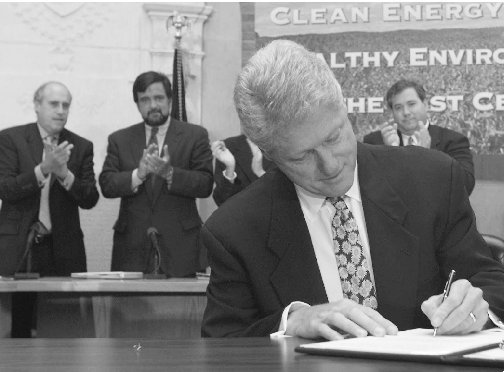Epilogue
Looking Toward a Sustainable Future
The largest impact that will be made in the world of energy production will most likely come from government policies. However much progress is made toward the production of efficient, inexpensive, renewable energy, it can never be fully implemented on a nationwide level without the backing and support of the U.S. government. There are many steps the government can take to help growth of renewable energy sources, making the United States less dependent on fossil fuels and opening the door to a sustainable energy future.
Government Support
The U.S. government can provide financial support for the exploration of renewable energy sources. This support can be in the form of grants given to researchers so they may experiment with renewable energy technology. The Department of Energy has developed a grant-based research project called the Climate Change Technology Initiative (CCTI). The CCTI seeks to find ways to reduce the emission of greenhouse gases. As part of this research project, the CCTI helps fund the Partnership for a New Generation of Vehicles. The partnership was formed between major car manufacturers and the U.S. government with the hope that technology developed through this research will reduce the amount of carbon dioxide emitted from cars in the United States. The grant also supports other experiments on new renewable energy resources.
To help advance renewable energy sources, the government can also support consumers who choose renewable energy sources over more traditional energy sources. Consumers can be given tax credits for purchasing solar panels, wind machines, or clean-fuel-burning cars. These tax credits would offset the high initial cost of these energy sources and make purchasing them more attractive to many people. Citizens of the state of Iowa have such a tax credit mandated in their state. Any materials purchased to produce either solar or wind power is exempt from state sales tax.
The U.S. government also can exercise its authority to order public utility companies to purchase excess power created by renewable energy resources, called net

As in the cases of Iowa's tax incentives and California's buyback of excess power, actions of support for renewable energy by the U.S. government are generally accepted by most businesses and consumers. Such steps are seen as having the potential to go a long way in supporting renewable resources if they are implemented and followed through on in the years to come. As the government implements these measures, analysts claim that renewable resources will see steady growth.
The Influence of Big Oil Companies
There are other measures that support the growth of renewable resources that the government has the option to take. These measures, not generally favored by some large businesses and some consumers, tend to be the most controversial. They are also seen as the actions that will help to ensure the quickest and most thorough transition from fossil fuels to renewable resources. For example, renewable energy proponents say the government

Energy analysts say that currently the U.S. government spends many times more the amount of money researching the efficiency of fossil fuels than it does the possibilities of renewable resources. This money could be shifted into programs that support the growth of renewable energy instead. In a study conducted by Research/Strategy/Management Inc. of Sterling, Virginia, 37 percent of American consumers said renewable energy should receive the most in research funding, while only 8 percent said research concerning fossil fuel should be of the highest priority. The other 55 percent said they felt funding should be spent in other areas. In this case, the oil industry and consumers seem to be in opposition concerning the proper focus for government-funded energy research.
The U.S. government has the power to greatly influence the development of renewable resources in this nation. Many energy analysts believe there will be no significant growth in renewable energy resources unless the government uses that power. Critics say that the legislation the government passes concerning energy production is often influenced greatly by large oil companies whose profits depend on producing fossil fuels. Some voters support such legislation because they simply want cheap gas. Others want an alternative source of power that will leave their children with a clean planet. Many people feel the decision to move toward a sustainable energy future requires that voters and corporations alike accept the responsibility of being stewards of the land instead of thinking only about financial gains.
Comment about this article, ask questions, or add new information about this topic: